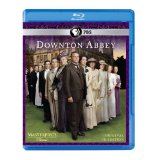| Reviews & Columns |
|
Reviews DVD TV on DVD Blu-ray 4K UHD International DVDs In Theaters Reviews by Studio Video Games Features Collector Series DVDs Easter Egg Database Interviews DVD Talk Radio Feature Articles Columns Anime Talk DVD Savant Horror DVDs The M.O.D. Squad Art House HD Talk Silent DVD
|
DVD Talk Forum |
|
|
| Resources |
|
DVD Price Search Customer Service #'s RCE Info Links |
|
Columns
|
|
|
Downton Abbey: Season 1
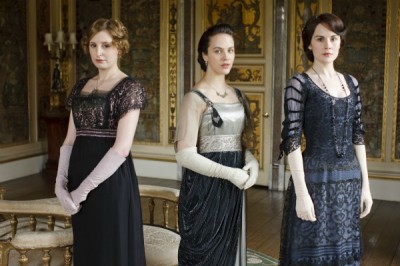
Please Note: The screen captures used here are taken from promotional materials provided by PBS, not the Blu-ray edition under review.
This reviewer is pretty late to the Downton Abbey party, but no less susceptible to its considerable charms than any among the legion of obsessive, addicted fans it has acquired over the last couple of years. Created and written by Julian Fellowes (with whose script for Altman's Gosford Park it is certainly of a piece), the series follows all the intertwining, crosshatching lives, loves, and schemes that go on within and between the upstairs aristocrats and the downstairs servants on the titular English country estate during the 1910s. It's part of PBS's "Masterpiece Classics" rebranding of its staid old warhorse, the decades-spanning "Masterpiece Theatre," but this is not your father's "Masterpiece Theatre." Yes, with its costumes, accents, and completely alien, meticulously re-created mannerisms and customs, it's "period" as all get-out. But it's not merely so, and that makes all the difference; it's got a liveliness, a supple and nuanced class/social awareness, and--not least--a funniness to it, all of which you'd have to go back to Dickens or Austen (two very English novelists whose sensibilities Fellowes seems to be updating for his spry, sprawling story) to find in its purest form.
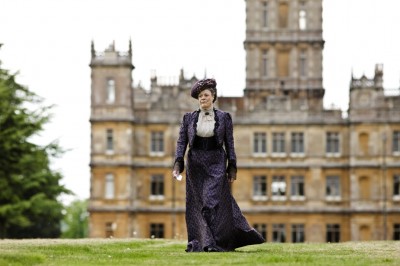
The upstairs family, The Crawleys, along with the minutely stratified subterranean world of downstairs servants that waits on them at Downton, together comprise about a dozen characters whose lives all seem to be on uncommonly winding, twisting, and turning paths. Lord and Lady Crawley (Hugh Bonneville, Iris, and Elizabeth McGovern, Once Upon A Time in America) have three adult or near-grown daughters: the marriageable but rapidly "aging" (she'll be 25 soon!) Mary (Michelle Dockery, The Red Riding Trilogy); the plain, put-upon, Jan Brady-like middle child, Edith (Laura Carmichael, Tinker Tailor Soldier Spy); and the youngest, a newly politicized women's-libber-ahead-of-her-time, Sybil (Jessica Brown Findlay). Lord Crawley married Lady Crawley--an American from New York--for her money, but luckily fell in love with her not long after they were married, and their warmth and affection gets them through their numerous quiet but determined disagreements and contests of wills; Mary and Edith have an ongoing sibling rivalry that's ugly when we first see it and is only bound to get worse (their catfighting viciousness reaches near-Dynasty levels by the first season's denouement and is one of the series' soapier elements); while the newly enlightened Sybil is a burgeoning suffragette and works as a job-hunter on behalf of a hesitantly self-improving maid, Gwen (Rose Leslie), who's surreptitiously trained herself on a newfangled machine called a typewriter in order to become a secretary. The family matriarch, the outwardly dotty and anachronistic, inwardly steely and ultrapragmatic Dowager Countess Violet Crawley (Maggie Smith)--who comes off like a brilliant cross between Wilde's Miss Prism and Eleanor Bron in The House of Mirth--presides over the family with a velvet glove and an iron fist, her fluttery bewilderment at things like indoor electric lighting, which makes her feel like she's "living in an H.G. Wells novel," notwithstanding.
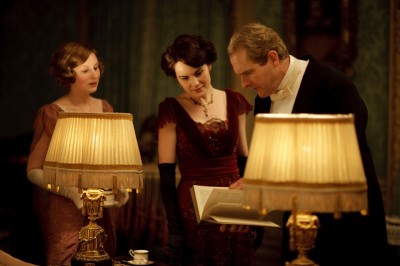
Meanwhile, downstairs, a new man, Bates (Brendan Coyle) arrives; he is a former military colleague of Lord Crawley's who is now to have a position as a footman, but his war-injured leg gives him a limp that makes the entire situation awkward for him and everybody else. (How can a "crippled" man do such a physically demanding job? Who among the staff would dare complain openly about the extra work they're thus burdened with?) The very starchy but not unkind, quasi-parental unit of head butler Mr. Carson (Jim Carter, My Week with Marilyn) and head lady's servant Mrs. Hughes (Phyllis Logan, Secrets and Lies) tries to keep everything running smoothly, wrangling, with varying degrees of success, a gaggle of underlings--frazzled cook Mrs. Patmore (Lesley Nicol), whose impending blindness is a sad but dangerous fact that she won't admit to; wide-eyed, maladroit new girl Daisy (Sophie McShera); the resentful duo of middle-aged lady's maid O'Brien (Siobhan Finneran) and footman Thomas (Rob James-Collier), whose underhanded scheming, especially against the upstanding Bates, is fuel for much of the series' plot fires; and Anna (Joanne Froggatt), a maid whose love for Bates will bestow her with the mission of believing in him when nobody else does and delving all the day down into his murky past, of which his limp is only the smallest tip of the iceberg.
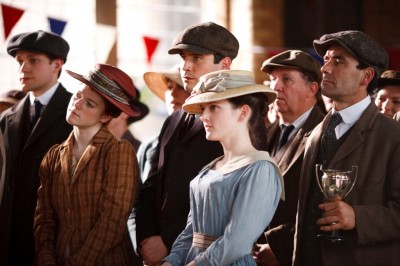
Into the midst of all this, a mysterious "middle" class is brought against its will in the form of distant relatives--a lawyer, Matthew Crawley (Dan Stevens), and his mother, Isobel (Penelope Wilton, You Will Meet A Tall Dark Stranger), a former nurse whose bustling righteousness and brisk efficiency make her a formidable archnemesis to the dowager countess (the passive-aggressive rivalry between the two provides a near-inexhaustible reserve of humor and, in its general harmlessness, offsets the much more sinister competitiveness between Mary and Edith). These (relatively) poor relations are sent for and come to Downton because Lord Crawley needs a male heir to keep the estate in the family, and after the Titanic sinks with Mary's unloved fiancé-for-convenience on board--an event that comes up almost immediately at the beginning and gets the series' ball rolling--the race is on to get her married off to an heir, with Matthew, the next male Crawley in line, being an obvious choice. Will the headstrong Mary acquiesce to this marriage, or will she break with tradition and marry for love (or is there the possibility of both with the dashing, skeptical Matthew)? Will she be undone by her sister Edith's barely-contained, envious rage toward her? Will Bates's past and the machinations of Tom and O'Brien against him undo his position on staff (which he desperately needs, both to make a living and for his embattled sense of honor and usefulness)? Those are the principal questions that, along with many other subplots, get worked out over the course of this first season's seven episodes and lead up to its cliffhanger, whose success is measurable by the fact that it makes you crave more like some kind of junkie; you simply can't imagine not knowing what happens next.
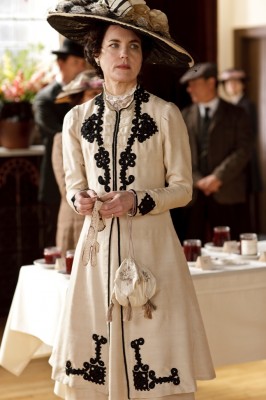
Downton is an insular world, but the life outside both beckons (to Sybil, most noticeably, with her free-thinking and progressive ideas) and encroaches (the necessary but unenthusiastic welcoming of modern technologies and more middle-class values), and Fellowes has bookended the whole season neatly with two major, cataclysmic world events (the concluding one more so than the initiating one) proving that no bubble or world-unto-itself, even one as privileged and remote as Downton, is unreachable or immune when it comes to the unpredictable convulsions of history. Fellowes, along with his various cowriters and the series' handful of capable directors, have created something juicy and engrossing here, something with a level of novelistic ambition that gives us well-drawn, nimbly fleshed-out characters and situations that are never quite what they appear; just when you think you have someone's number or know who's a villain and who's a saint, an unexpected but perfectly convincing complication or newly revealed characteristic throws you off and keeps you curious and open to whatever might transpire next. This evident high setting of the bar for Downton Abbey's plots and characterizations are matched surprisingly often by a lively, cinematic quality at the visual level, with often rather lovely compositions and lighting that do their part to make the series more than just one of those things that leans on nice antiques, luxurious rooms, and period accuracy for its interest (i.e., the kind of thing that the most negative stereotypes of PBS/BBC/"Masterpiece Theatre" might call to prejudiced minds.) There's also an ongoing, fairly impressive matching of shooting styles and camera movements with the feel and tone called for by the dramatic moment or event in question that further that more-movie-than-TV feel. (There are exterior, parasol-toting walks on the grounds that I'd be willing to bet are visually inspired by Cries and Whispers, and there's an especially striking bravura tracking shot that starts the series off with a bang and recalls nothing so much as the long, long, memorably bold and well-done Steadicam track that takes us through all of a backstage area in Magnolia).
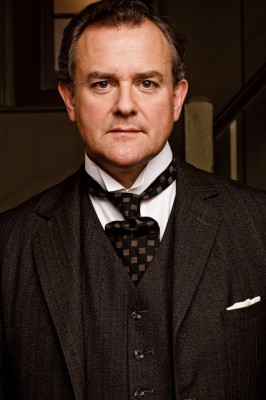
So, do all those points in its favor make Downton Abbey a bona-fide part of the great-and-innovative TV revolution (e.g., The Sopranos, Mad Men, et. al) of recent times? Well, yes and no--at least not yet. At least here, in its first season, it's not quite up to the astonishingly unerring instincts and better-than-most-movies standards set by the greatest of the latter-day TV crop; it makes just a few too many bows to nighttime-soap convention for that (there's a lot of exposition, and the significance of what's revealed is telegraphed through reaction-shot editing that's skillful but not always so subtle). But those little conventional, unambitious moments where things just move forward and plot points are connected are still much less frequent than one might expect, and they're not flaws so much as ordinary business that pale in comparison to what Fellowes, the great, appealing cast, and the directors and videographers do manage to extraordinarily. This is the kind of addictive series--one that gets us so caught up in who's doing what, who wants what, and what's going to happen next that you lose perspective, as does the show itself from time to time--that you're tempted to think of it as a guilty pleasure, like a soap opera or anything else that obviously and unabashedly relies too heavily on direct identification with characters or invests more energy in working out the plot than in finding just the right way to put it across and make a lingering impact. But Downton Abbey often enough has the restraint, resourcefulness, and wit to transcend any sugar-rush disposability and reach the heights of well-sketched, fully fleshed-out and complex dramatic life that it is becomes, on the whole, a pleasure you really don't need to feel guilty about at all.
THE BLU-RAY DISC:
The 1.78:1 widescreen aspect-ratio, 1080i HD transfer transmits all the vivid colors and various tones/temperatures of Gavin Struthers and David Katznelson's splendidly-lit, rich high-def DV videography without, as typical for digital-to-digital transfers, even the slightest trace of compression artifact in any form. (A technical note: Some Blu-ray players, like mine, do not automatically switch the output mode from 1080p to 1080i for 1080i media, in which case one needs to manually switch the output--not forgetting to switch it back for 1080p media!--to avoid a minor but noticeable "stutter" in the image that comes from the player trying to up-convert the information from 1080i to 1080p.)
Sound:The DTS 2.0 soundtrack is excellent--clear, pure, and resonant at every level, with no imbalance or distortion whatsoever.
Extras:Two promotional featurettes, "The Making of Downton Abbey" (13 min.) and "A House in History" (10 min.), provide some decent context regarding the way the series was conceived, produced, and shot, as well as the all-important finding and securing of the location (a real English castle) at the center of the story, with commentary provided through interviews with Fellowes; various producers, crew members, advisors, and performers; and the real-life-aristocrat owner of Highclere Castle, where the series' exteriors and "upstairs" portions are shot (with the "downstairs" portions, because of modernization of servants' quarters at Highclere, shot on sets built at Ealing Studios).
FINAL THOUGHTS:Downton Abbey fully deserves its ever-more-propulsive bandwagon, which is one that's more fun and rewarding than most to hop onto. The process of living through all its characters' very eventful lives and reversals of fortune, discovering their well-hidden pasts and unexpected capacities for both better and worse than we might expect of them, taps into one of the most basic and powerful appeals that series television offers us, and it's hard to imagine anyone not getting involved at just that immediate, what-happens-next level. But it's also all written, performed, and made with enough artistic skill, flair, and genuine sophistication that that it becomes neither a stuffy "Masterpiece Theatre" self-parody nor just one of your elderly aunts' and grandmothers' interchangeable, revelation-a-minute "stories." In other words, it lives up to its hype, and if its great, addictive, can't-watch-just-one fun is an essential part of it, it has a real classiness to it, too--not the pretentious kind that you can lacquer on from the outside with period trappings and overawe for visible wealth, but a taste and sensitivity that comes from the bottom up and emerges through the story and its telling from the inside out. Recommended.
|
| Popular Reviews |
| Sponsored Links |
|
|
| Sponsored Links |
|
|
| Release List | Reviews | Shop | Newsletter | Forum | DVD Giveaways | Blu-Ray | Advertise |
|
Copyright 2024 DVDTalk.com All Rights Reserved. Legal Info, Privacy Policy, Terms of Use,
Manage Preferences,
Your Privacy Choices | |||||||









